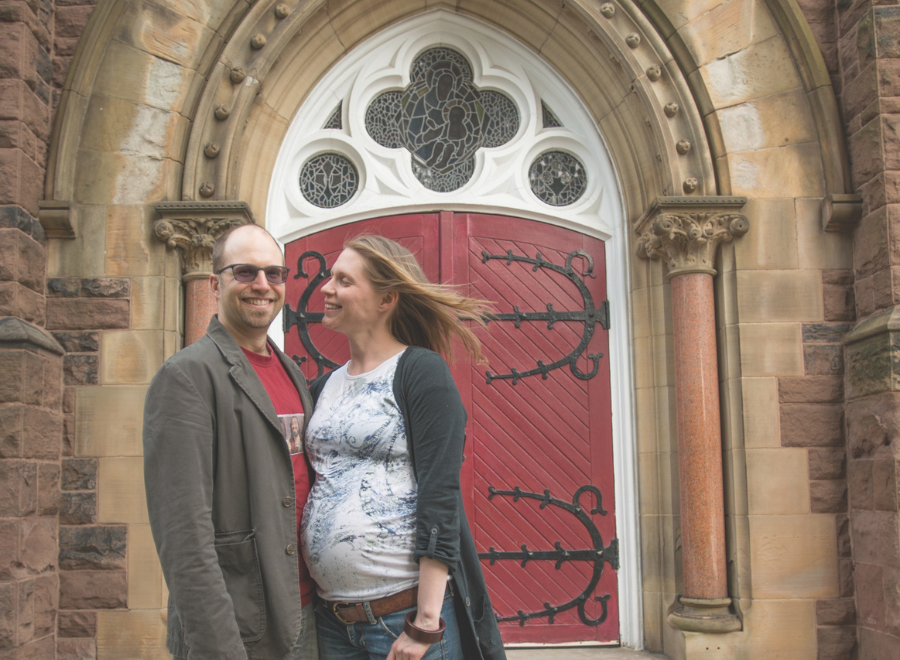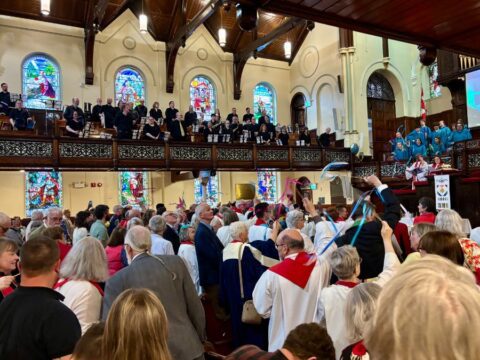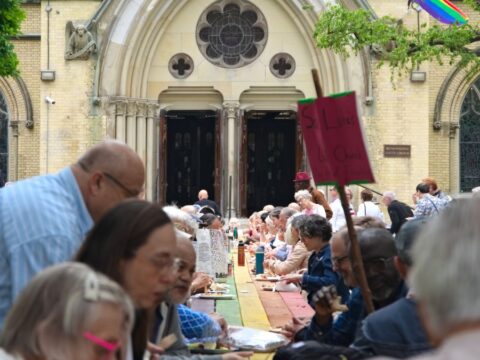As members of Generation Y, Nicole Hergert and Greg Powell are not surprised or disappointed to be over 30 and still working part-time jobs. In fact, the couple earn $30,000 a year between them working four part-time outreach jobs — all for the United Church. Powell works for Toronto’s Bloor Street United, supporting faith formation, leading Youth on Bloor, and running a weekly community café outreach program. He also works on contract for a climate justice group and attends Emmanuel College full time with a view to becoming an ordained United Church minister. Hergert, meanwhile, runs the children’s programs at nearby Trinity-St. Paul’s United, and was due to have their first child in May.
“Congregational outreach is very close to the core of Jesus’ teachings,” says Powell. Working at the margins of the church is vital, he believes, for meeting people’s material and spiritual needs, for drawing new members into congregations and for the spiritual development of existing church members. “Yet the amount of resources congregations have access to is so limited compared to the scale of the challenge, it’s impossible for any congregation to be as effective as we need to be.”
General Council does not keep track of how many outreach jobs funded by congregations and Presbyteries are part time. But anecdotally, it’s a lot. Sunday schools and youth groups, music programs, summer camps, chaplaincies, food and advocacy programs in the inner cities, and unique pilot ministries are frequently staffed by part-timers. Some of the part-time jobs pay well and may be part of General Council’s pay structure. Some do not.
How did we get here? Powell suggests a perfect storm of factors. Canada’s middle-class squeeze has birthed the dual-income family, he says — meaning volunteers are no longer available to do work that was once unpaid, such as teaching Sunday school and leading youth groups. The federal and many provincial governments have cut social programs, forcing non-profits to pick up what’s been dropped. And the general decline of Christendom, he says, has depleted the church of cash.
As a result, congregations and other church agencies have faced competing pressures to both employ people and cut spending. Full-time work is the casualty.
Setting aside the question of whether it’s fair to offer only part-time hours, what is it costing the church’s future when so many of those charged with growing and evolving the church are spread thin across two or more jobs?
Sheryl Johnson, 27, works part time as a Sunday school co-ordinator and part time as a fundraising assistant for the ecumenical justice group KAIROS. She believes this model — hundreds of tiny jobs — isn’t as effective as it could be.
“Part time is really costing us youth and children,” says Johnson, who graduated with her master of divinity in 2013. “Part-time hours mean it’s harder to attract people with a theological education. . . . It becomes about basketball in the [church] basement. What a loss if you never have kids and teens talking about their faith.”
Part time, she says, is often a low-commitment arrangement; because the employer won’t cover the employee’s financial needs, the employee is likely to be transitory, leaving the job after a year or two. Because employees may be working multiple jobs to make ends meet, they’re not going to be available for every meeting and event, and their ministry can become segregated from the rest of the congregation.
But Johnson is sympathetic to how the situation evolved. When she returns to school for her PhD, she plans to study the theological ethics of funding and fundraising.
Similarly, Beth Baskin has worked as a layperson for the United and Anglican churches — sometimes full time, sometimes part time, and often on contract — for 25 years. She’s been downsized three times as funding dried up. Currently, she’s part time by choice, as the social justice co-ordinator at Toronto Southeast Presbytery.
“It says a lot about how we value this kind of work, to be honest,” she says. “We still have the sacred cow of the paid ordained person. Everyone seems to understand that outreach is important, but we’re still not using our resources there.”
Of course, the church is not unique in relying on part-timers. In March, the Canadian Chamber of Commerce reported that 95 percent of new jobs created last year were part time.
And with more than one United Church congregation closing per week, these part-time outreach positions seem like disjointed points of hopefulness in an otherwise dark time. Strategically speaking, what exactly is the United Church doing here?
At Toronto’s Trinity-St. Paul’s United, the strategy is obvious. Hergert’s Sunday school is booming. The implicit goal of outreach, she knows, is bums in pews. With 20 kids, plus their families, regularly attending her church, this is an envy-inducing success.
“We have [attracted] people with either no church background or who grew up in the church but left,” says Hergert. “My interest is about deepening the experience rather than just having a lot of numbers.”
Frankly, the congregation is getting both — and a great deal. Hergert, who has a master’s degree in social development and years of experience in programming and social work, can’t find a stable job in her field. So she accepts $125 for six hours of work per week but puts in about 20 hours.
“What I’ve done here isn’t magic,” says Hergert. “Now the congregation has seen what’s possible. So if there is a co-ordinator [hired after me] who works just their six hours a week, [the congregation] will have a sense that they either need to provide more resources or figure out how to do it themselves [as volunteers].”
If the future of the church lies in traditional congregations, simply replicating Hergert’s program and throwing the church’s remaining money at other membership-growing endeavours would be a great strategy.
But if the future of the church looks significantly different, figuring out how to fund effective outreach is a challenge.
In the past, for example, paying for full-time university chaplains theoretically guaranteed a generation of educated church leaders ready to swoop back into local congregations as young professionals with young families — an easy formula for regenerating the church, according to Rev. Neil Whitehouse. That formula no longer works, he says, yet chaplaincies continue to evangelize in rich and radical ways.
As a part-time chaplain funded jointly by the Anglican and United churches, Whitehouse reaches out to more than 38,500 students at Montreal’s McGill University, many of whom have rejected organized religion but are intellectually and spiritually engaged.
It’s a “crucial ministry” for scouting the future face of the denomination, he says. On campus, his discussion group — where students walk a labyrinth then meet for conversation — has evolved into a plucky interfaith council. His Oikos Project, a walking and discussion program that brings people together on the mountain behind the university, combines interdisciplinary education and spirituality to give students the tools to solve what he describes as “the 21st century’s biggest problem: overconsumption.”
He’s watched as United Church chaplaincy funding has eroded over the last decade. Now, he fundraises to make up part of his own pay. “Frontier work is never that secure,” he says dryly.
Surprisingly, Whitehouse doesn’t advocate for a simple return to full-time chaplaincy position funding. Instead, he says, this conversation should be about transforming paid ministry for a secular time of scarcity. The church, he notes, should seek out, nurture and fully employ a core of key people: “ministers who are alive to our tradition and are able to manifest that tradition to us as sages. Those who can be that changed person and offer that to others.”
Part-time work is a symptom of a larger conversation that needs to happen, he notes, rather than its own simple solvable problem. What should get funded in an era of scarcity and transformation? The status quo? Innovative outreach? Or something else?
Meanwhile, Powell and Hergert are looking forward to escaping part-time hours and multiple jobs for a more conventional lifestyle.
Later this year, they’ll move to wherever Powell gets settled. He’ll work full time in congregational ministry; she’s planning to leave work for her early mothering years — a values-based decision — and to reinvent the role of the minister’s wife for the 21st century. Together, they plan to transform worship into an engaging intergenerational model, rather than sending the children and teens out with paid part-timers.
“I’m not averse to doing things for free,” says Hergert, noting that their situation is unusual, and lucky. “Contributing is important. If it brings you joy, do it.”
But part-time work? They’re leaving for greener pastures.
***
This story first appeared in The United Church Observer’s June 2014 issue with the title “Understaffing the Future.”















